Category Archives: Pacific
Oregon’s Dungeness crab fuels families, $68M a year industry
 For many people, when Dungeness crab is on the menu, it’s a go-to in Oregon. It’s a savory treat that fuels a multi-million dollar a year industry in the state. “If I could, I’d eat it every day,” said Jared Reeves, a crab fisherman out of Coos Bay, whose spent much of his life on a boat, fishing with family. It’s a tradition that not only supports the state economy, but also families up and down the Oregon coast, like Reeves’. According to numbers from the Oregon Dungeness Crab Commission, commercial crabbing has over the last decade pulled in an average of more than $68 million a year. Typically, Dungeness crab fishing brings in more money than every other type of fishing in Oregon, said Crystal Adams, the executive director of the commission, which supports and promotes the state’s crabbing industry. Video, more, >>CLICK TO READ<< 09:39
For many people, when Dungeness crab is on the menu, it’s a go-to in Oregon. It’s a savory treat that fuels a multi-million dollar a year industry in the state. “If I could, I’d eat it every day,” said Jared Reeves, a crab fisherman out of Coos Bay, whose spent much of his life on a boat, fishing with family. It’s a tradition that not only supports the state economy, but also families up and down the Oregon coast, like Reeves’. According to numbers from the Oregon Dungeness Crab Commission, commercial crabbing has over the last decade pulled in an average of more than $68 million a year. Typically, Dungeness crab fishing brings in more money than every other type of fishing in Oregon, said Crystal Adams, the executive director of the commission, which supports and promotes the state’s crabbing industry. Video, more, >>CLICK TO READ<< 09:39
Fishermen want to go green but say DOGE cuts prevent that
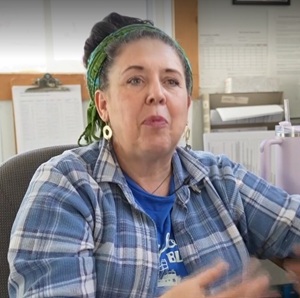 Commercial fishermen and seafood processors and distributors looking to switch to new, lower-carbon emission systems say the federal funding they relied on for this work is either frozen or unavailable due to significant budget cuts promoted by President Donald Trump’s Department of Government Efficiency. The changes are designed to replace old diesel-burning engines and outdated at-sea cooling systems and are touted by environmentalists as a way to reduce seafood’s carbon footprint. Salmon harvesters in Washington state, scallop distributors in Maine and halibut fishermen in Alaska are among those who told The Associated Press their federal commitments for projects like new boat engines and refrigeration systems have been rescinded or are under review. Photos, video, more, >>CLICK TO READ<< 10:51
Commercial fishermen and seafood processors and distributors looking to switch to new, lower-carbon emission systems say the federal funding they relied on for this work is either frozen or unavailable due to significant budget cuts promoted by President Donald Trump’s Department of Government Efficiency. The changes are designed to replace old diesel-burning engines and outdated at-sea cooling systems and are touted by environmentalists as a way to reduce seafood’s carbon footprint. Salmon harvesters in Washington state, scallop distributors in Maine and halibut fishermen in Alaska are among those who told The Associated Press their federal commitments for projects like new boat engines and refrigeration systems have been rescinded or are under review. Photos, video, more, >>CLICK TO READ<< 10:51
‘It made me feel crazy’ | Filipino fishermen spent nearly 2 months trapped aboard fishing vessels in Westport
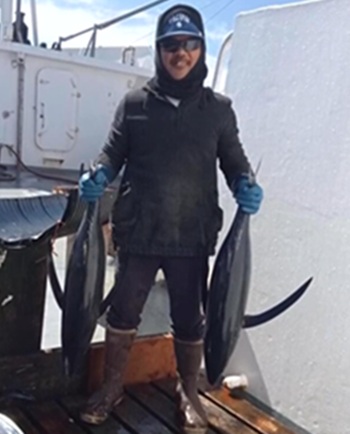 In the Pacific waters off Washington’s coast, fishermen work 18-hour shifts, hauling fish that can weigh up to 80 pounds. Commercial Albacore fishing was what drew Reyner Dagalea, Ray Sevella and Norberto Zebrele and dozens of other men to the United States from the Philippines. They agreed to work a contract with a U.S. fishing company in the summer of 2023. After spending time at sea, fishermen contracted by U.S.-based McAdams Fish and its Filipino counterpart Pescadores docked in Westport. There were 24 men, in all, across multiple boats. U.S. law does not require that foreign fishermen have visas to work aboard vessels owned by U.S. companies. But once the boats docked, the men were told that if they got off the ships, they would be arrested, fined and then deported. Video, more, >>CLICK TO READ<< 12:50
In the Pacific waters off Washington’s coast, fishermen work 18-hour shifts, hauling fish that can weigh up to 80 pounds. Commercial Albacore fishing was what drew Reyner Dagalea, Ray Sevella and Norberto Zebrele and dozens of other men to the United States from the Philippines. They agreed to work a contract with a U.S. fishing company in the summer of 2023. After spending time at sea, fishermen contracted by U.S.-based McAdams Fish and its Filipino counterpart Pescadores docked in Westport. There were 24 men, in all, across multiple boats. U.S. law does not require that foreign fishermen have visas to work aboard vessels owned by U.S. companies. But once the boats docked, the men were told that if they got off the ships, they would be arrested, fined and then deported. Video, more, >>CLICK TO READ<< 12:50
Boat tours and ash scatterings help beleaguered California salmon fleet stay afloat
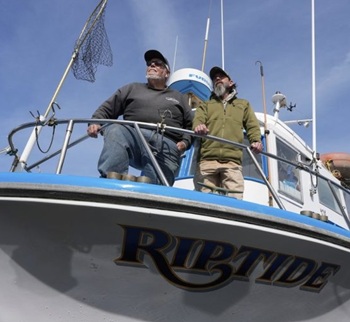 “The bills keep going, whether I’ve got a fishery or not,” said Smith, who runs Riptide Sportfishing in Half Moon Bay, California. “There’s no season on when people die.” California’s sport and commercial fishermen have been walloped by two years of salmon closures and are bracing for a potential third, which they blame on a years-earlier drought and state and federal water management policies they say have made it tough for the species to thrive. The closures have taken a toll on people’s livelihoods in coastal communities where salmon, fishermen say, is a special fish. “We are people that are hardworking and it’s our jobs on the line,” said Sarah Bates, a commercial fishing captain in San Francisco. She said local markets have been devastated by the salmon closures and Bay Area restaurants aren’t snapping up halibut or other catch as they did salmon. more, >>CLICK TO READ<< 06:36
“The bills keep going, whether I’ve got a fishery or not,” said Smith, who runs Riptide Sportfishing in Half Moon Bay, California. “There’s no season on when people die.” California’s sport and commercial fishermen have been walloped by two years of salmon closures and are bracing for a potential third, which they blame on a years-earlier drought and state and federal water management policies they say have made it tough for the species to thrive. The closures have taken a toll on people’s livelihoods in coastal communities where salmon, fishermen say, is a special fish. “We are people that are hardworking and it’s our jobs on the line,” said Sarah Bates, a commercial fishing captain in San Francisco. She said local markets have been devastated by the salmon closures and Bay Area restaurants aren’t snapping up halibut or other catch as they did salmon. more, >>CLICK TO READ<< 06:36
Mass Layoffs at Companies Working on Humboldt Offshore Wind Projects; At Least Some Local People Laid Off
 The future of Humboldt County’s offshore wind industry appears increasingly uncertain following mass layoffs at RWE and Vineyard Offshore, the multinational energy companies leading efforts to develop commercial-scale floating wind farms on the North Coast. The job cuts come in response to widespread market uncertainty following President Donald Trump’s efforts to ban offshore wind development in the United States. In a regulatory filing submitted last week, RWE Offshore Wind Services, LLC confirmed its plans to cut dozens of jobs in its U.S. offshore wind division. Lots of links. more, >>CLICK TO READ<< 11:38
The future of Humboldt County’s offshore wind industry appears increasingly uncertain following mass layoffs at RWE and Vineyard Offshore, the multinational energy companies leading efforts to develop commercial-scale floating wind farms on the North Coast. The job cuts come in response to widespread market uncertainty following President Donald Trump’s efforts to ban offshore wind development in the United States. In a regulatory filing submitted last week, RWE Offshore Wind Services, LLC confirmed its plans to cut dozens of jobs in its U.S. offshore wind division. Lots of links. more, >>CLICK TO READ<< 11:38
Athearn Marine Agency Boat of the Week: 54’x17′ Fiberglass Dragger, 451HP Cummins X15 Diesel
 To review specifications, information, with 21 photos, >click here<. To see all the boats in this series >click here< 06:15
To review specifications, information, with 21 photos, >click here<. To see all the boats in this series >click here< 06:15

West Coast fishery managers troubled by NOAA layoffs as another 1,000 employees expected to be let go
The long-term impacts of staff cuts at the National Oceanic and Atmospheric Administration are still unknown, but fishery managers on the West Coast say the situation is troubling. On Feb. 27, NOAA laid off more than 800 workers as the Trump administration continues its push to reduce the federal workforce. On Saturday, the New York Times reported that the nation’s premier agency for weather and climate science has been told by the Trump administration to prepare to lose another 1,000 workers. more, >>CLICK TO READ<< 09:49

Low salmon numbers in California could prompt shutdown of fishing for a record third straight year
California’s salmon population has declined so severely over the last several years that regulators canceled the fishing season in 2023 and again in 2024. This year, state estimates show the number of Chinook salmon is still so low that fishing could again be prohibited — or if not, sharply limited — to help fish stocks recover. “A lot of the guys right now are basically doing land jobs because the fishery has just been devastated,” said George Jue, a commercial fisherman at Pillar Point Harbor in Half Moon Bay. Even as many fishing boats have sat idle in the harbor lately, Jue and a group of other fishermen have been busy hauling in traps filled with crabs. Once that season is over, Jue said, he expects little or no salmon fishing this year. “This harbor is going to be dead.” more, >>CLICK TO READ<< 08:50
Trump’s Offshore Wind Review to Consider Status of Projects
 The Trump administration’s ongoing review of offshore wind projects will feature different treatment for projects actively under development versus those that have merely been proposed, Interior Secretary Doug Burgum said Thursday. Burgum’s comments during a visit to a natural gas export terminal in Louisiana suggest the administration may apply less scrutiny to wind farms that have already secured federal permits and are under construction. President Donald Trump indefinitely halted the sale of new offshore wind leases on his first day in office and pausing permitting of all wind projects on federal lands and waters. He also raised the specter of outright cancellations for existing leases. The president directed the Interior Department to review the “necessity of terminating or amending any existing wind energy leases” and “identifying any legal bases for such removal.” more, >>CLICK TO READ<< 12:26
The Trump administration’s ongoing review of offshore wind projects will feature different treatment for projects actively under development versus those that have merely been proposed, Interior Secretary Doug Burgum said Thursday. Burgum’s comments during a visit to a natural gas export terminal in Louisiana suggest the administration may apply less scrutiny to wind farms that have already secured federal permits and are under construction. President Donald Trump indefinitely halted the sale of new offshore wind leases on his first day in office and pausing permitting of all wind projects on federal lands and waters. He also raised the specter of outright cancellations for existing leases. The president directed the Interior Department to review the “necessity of terminating or amending any existing wind energy leases” and “identifying any legal bases for such removal.” more, >>CLICK TO READ<< 12:26
There’s a Fish Market Splashing into Eureka
 Something fishy is moving from the Woodley Island Marina’s docks across the bay to Eureka’s Madaket Plaza, where Humboldt County will have its first fisher’s market, starting in May or June. Ashley Vellis, owner of Ashley’s Seafood, has been brewing up the idea of a local fish market since late 2019 and is now partnering with the North Coast Grower’s Association to organize it, currently working on fundraising to make the new addition to Eureka’s waterfront a reality. Taking inspiration from dockside markets in Santa Barbara, San Diego and San Francisco, Vellis says that she wants to make it more accessible for people to purchase seafood directly from the source. The vision is that local fishers will have stalls to sell their latest and freshest catch. more, >>CLICK TO READ<< 12:25
Something fishy is moving from the Woodley Island Marina’s docks across the bay to Eureka’s Madaket Plaza, where Humboldt County will have its first fisher’s market, starting in May or June. Ashley Vellis, owner of Ashley’s Seafood, has been brewing up the idea of a local fish market since late 2019 and is now partnering with the North Coast Grower’s Association to organize it, currently working on fundraising to make the new addition to Eureka’s waterfront a reality. Taking inspiration from dockside markets in Santa Barbara, San Diego and San Francisco, Vellis says that she wants to make it more accessible for people to purchase seafood directly from the source. The vision is that local fishers will have stalls to sell their latest and freshest catch. more, >>CLICK TO READ<< 12:25
Oregon crab fishery faces scrutiny after record whale entanglements
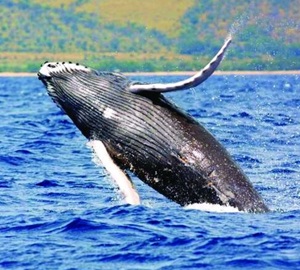 Oregon’s commercial Dungeness crab fishery is under increasing pressure to address whale entanglements after a record-breaking four incidents in 2024, including one as recently as January 6th. The Oregon Department of Fish and Wildlife (ODFW) has issued an advisory to crabbers, urging them to be vigilant and avoid setting gear in areas where whales are transiting or foraging; however, conservation groups like Oceana, a leading ocean conservation organization, criticized the advisory as inadequate and the voluntary measures are insufficient and they are calling for stronger, more decisive action. The ODFW advisory, while acknowledging the high number of entanglements, relies on voluntary compliance from the fishing fleet. It reminds crabbers to use best practices, such as minimizing surface gear, avoiding areas with high whale activity and promptly removing gear from the ocean. more, >>CLICK TO READ<< 14:51
Oregon’s commercial Dungeness crab fishery is under increasing pressure to address whale entanglements after a record-breaking four incidents in 2024, including one as recently as January 6th. The Oregon Department of Fish and Wildlife (ODFW) has issued an advisory to crabbers, urging them to be vigilant and avoid setting gear in areas where whales are transiting or foraging; however, conservation groups like Oceana, a leading ocean conservation organization, criticized the advisory as inadequate and the voluntary measures are insufficient and they are calling for stronger, more decisive action. The ODFW advisory, while acknowledging the high number of entanglements, relies on voluntary compliance from the fishing fleet. It reminds crabbers to use best practices, such as minimizing surface gear, avoiding areas with high whale activity and promptly removing gear from the ocean. more, >>CLICK TO READ<< 14:51
Lawmakers consider permanent funding for helpline for farmers, loggers and fishermen
 For more than a year, Oregonians involved in agriculture, forestry and the fishing industry have had a resource to help them when they’re in a mental health crisis. The AgriStress helpline, which launched in Oregon in September 2023, is geared toward people in those industries, offering a safe option to those who ordinarily might not seek help. “The pull-yourself-up-by-your-boot-strings mentality often prevents our community members from seeking help, making resources like the AgriStress helpline vital to breaking that cycle as imperative,” Republican state Rep. Bobby Levy of Echo, a longtime farmer and rancher, said during a recent legislative meeting on a bill to keep the line operating in perpetuity. more, >>CLICK TO READ<< 09:43
For more than a year, Oregonians involved in agriculture, forestry and the fishing industry have had a resource to help them when they’re in a mental health crisis. The AgriStress helpline, which launched in Oregon in September 2023, is geared toward people in those industries, offering a safe option to those who ordinarily might not seek help. “The pull-yourself-up-by-your-boot-strings mentality often prevents our community members from seeking help, making resources like the AgriStress helpline vital to breaking that cycle as imperative,” Republican state Rep. Bobby Levy of Echo, a longtime farmer and rancher, said during a recent legislative meeting on a bill to keep the line operating in perpetuity. more, >>CLICK TO READ<< 09:43

Guest writers: Bellingham’s SE Alaska salmon fleet threatened by lawsuits, misinformation
We appreciated Ed Johnston’s opinion editorial on Feb. 19, calling for cooperation in how we manage our salmon fisheries under the Pacific Salmon Treaty. As Washingtonians and Alaskans, we know that our shared Pacific salmon fisheries must be managed in a manner that considers how interceptions of salmon bound for distant watersheds may impact ecosystems, salmon populations and communities coastwide. That is why Washington sits alongside Alaska — as well as Canada — at the negotiating table under the Pacific Salmon Treaty. In order for our salmon and people to thrive, interceptions of salmon between the two countries must be managed using sound science and a cooperative approach. Our commitment to cooperative management and working collaboratively under the Pacific Salmon Treaty is as strong as our commitment to sustainable fishing livelihoods. more, >>CLICK TO READ<< 08:24
Sleeping with the fishes: It’s time to resurrect accountability in U.S. fishery regulation
 If you’re expected to comply with hundreds of federal rules and regulations that affect your livelihood, wouldn’t you like to know that those rules come from people accountable to you in some way? That’s how our laws are made, after all. They come from Congress, which is accountable to the people through the democratic process. Yet much of what we call federal law comes in the form of rules that are not written by Congress but by unelected bureaucrats in hundreds of federal agencies. To make sure even bureaucrats are accountable, the Constitution usually requires them to be appointed by the president, with Senate confirmation if they have significant authority, like the power to issue rules with the force of law. Unfortunately, Congress often side-steps the Constitution by giving the job of appointing certain officers to someone else. A good example is the regulation of marine fisheries. more, >>CLICK TO READ<< 10:40
If you’re expected to comply with hundreds of federal rules and regulations that affect your livelihood, wouldn’t you like to know that those rules come from people accountable to you in some way? That’s how our laws are made, after all. They come from Congress, which is accountable to the people through the democratic process. Yet much of what we call federal law comes in the form of rules that are not written by Congress but by unelected bureaucrats in hundreds of federal agencies. To make sure even bureaucrats are accountable, the Constitution usually requires them to be appointed by the president, with Senate confirmation if they have significant authority, like the power to issue rules with the force of law. Unfortunately, Congress often side-steps the Constitution by giving the job of appointing certain officers to someone else. A good example is the regulation of marine fisheries. more, >>CLICK TO READ<< 10:40
Remembering Mason Evich: GoFundMe set up for Fairhaven man killed in head-on crash
 Friends and family of 28-year-old Mason Evich remember him as someone who will be deeply missed by all who had the privilege of knowing him. The commercial fisherman tragically lost his life in a head-on crash on the New Bedford-Fairhaven Bridge on Feb. 20, and heartfelt tributes are flooding in to honor his memory. A GoFundMe, Honoring Mason’s Life with Love, was started by Ryley Santos as a tribute to Evich. To date it has raised more than $58,000, exceeding the initial $25,000 goal. A group of friends got together and wrote a tribute to Evich on GoFundMe. Links, more, >>CLICK TO READ 06:53
Friends and family of 28-year-old Mason Evich remember him as someone who will be deeply missed by all who had the privilege of knowing him. The commercial fisherman tragically lost his life in a head-on crash on the New Bedford-Fairhaven Bridge on Feb. 20, and heartfelt tributes are flooding in to honor his memory. A GoFundMe, Honoring Mason’s Life with Love, was started by Ryley Santos as a tribute to Evich. To date it has raised more than $58,000, exceeding the initial $25,000 goal. A group of friends got together and wrote a tribute to Evich on GoFundMe. Links, more, >>CLICK TO READ 06:53
Washington man arrested for stealing $8M fishing boat with crew still on board, officials say
 A 42-year-old man from Aberdeen, Wash. is being held on $250,000 bail, after he allegedly stole an 80-foot, $8 million commercial fishing boat out of Westport on Feb. 8 with the crew still on board. Suspect Joshua Stedman boarded the Jamie Marie around 9 a.m. and temporarily convinced the crew that he was the boat’s new captain, Washington Department of Fish and Wildlife Police said. “A subject had boarded the vessel, woke the crew and advised them they needed to get underway,” the Washington Department of Fish and Wildlife Police wrote on social media. “The newer crew did not know the captain, but didn’t argue, thinking he was an alternate operator, or someone sent by the real captain. He surely acted the part as he knew how to start and operate the large vessel.” more, >>CLICK TO READ<< 07:58
A 42-year-old man from Aberdeen, Wash. is being held on $250,000 bail, after he allegedly stole an 80-foot, $8 million commercial fishing boat out of Westport on Feb. 8 with the crew still on board. Suspect Joshua Stedman boarded the Jamie Marie around 9 a.m. and temporarily convinced the crew that he was the boat’s new captain, Washington Department of Fish and Wildlife Police said. “A subject had boarded the vessel, woke the crew and advised them they needed to get underway,” the Washington Department of Fish and Wildlife Police wrote on social media. “The newer crew did not know the captain, but didn’t argue, thinking he was an alternate operator, or someone sent by the real captain. He surely acted the part as he knew how to start and operate the large vessel.” more, >>CLICK TO READ<< 07:58
Grounded fishing boat removed from Salmon Creek beach after nearly a decade
 In the nine years since the F/V Verna A II ran ashore south of Salmon Creek on the Sonoma Coast, the beached vessel has become part of the landscape, its decaying hull disappearing and reemerging out from the sand and surf. On Tuesday, however, three excavators fought 16-foot surf to finally drag what was left of the rusted fishing boat out of the sand once and for all. The effort, spearheaded by California State Parks, the National Marine Sanctuary Foundation and the Greater Farrallones and Cordell Bank National Marine Sanctuaries, was finally made possible with funding from the Biden-era Bipartisan Infrastructure Law through the NOAA Marine Debris Program. Video, Photos, more, >>CLICK TO READ<< 07:12
In the nine years since the F/V Verna A II ran ashore south of Salmon Creek on the Sonoma Coast, the beached vessel has become part of the landscape, its decaying hull disappearing and reemerging out from the sand and surf. On Tuesday, however, three excavators fought 16-foot surf to finally drag what was left of the rusted fishing boat out of the sand once and for all. The effort, spearheaded by California State Parks, the National Marine Sanctuary Foundation and the Greater Farrallones and Cordell Bank National Marine Sanctuaries, was finally made possible with funding from the Biden-era Bipartisan Infrastructure Law through the NOAA Marine Debris Program. Video, Photos, more, >>CLICK TO READ<< 07:12

Imposter captain steals Westport fishing boat with crew onboard
An imposter stole a fishing vessel — with the crew still on board — from a dock in Westport, according to the Washington Department of Fish and Wildlife (WDFW) Police. WDFW Sergeant Alexander was reportedly patrolling in Westport when he “heard a radio call for a vehicle theft in progress; not the usual car or motorcycle theft, but an eight-million-dollar, 80-foot commercial fishing vessel, the Jamie Marie.” According to police, the imposter had boarded the boat, awoken the crew, and informed them that they needed to get underway. The newer crew who didn’t know the captain didn’t argue, thinking he was perhaps an alternate operator or sent by the real captain. more, >>CLICK TO READ<< 15:09
Commercial Fisherman Mason C. Evich, 28, of Fairhaven died February 20, 2025. He was a devoted son, brother, and loyal friend.
 He was everything wonderful. If you were lucky enough to know Mason, you LOVED him. A beacon of kindness, with a gentle soul that touched everyone he met, the pain we feel in losing him is indescribable. Born in Seattle, Washington, Mason was the loving son of Dagne (Sovik) Evich and the late Adam Evich. Mason’s love for fishing was passed down from his father, a lifelong commercial fisherman. Each summer, Mason accompanied his dad to Bristol Bay, Alaska, where they salmon fished together on the family’s fishing vessel. After graduating from Fairhaven High School, Mason attended the Northeast Maritime Institute, where he earned his associate degree and captain’s license. He later worked as a mate on commercial fishing vessels out of Cape May, NJ, and New Bedford, MA. more, >>CLICK TO READ<< 14:28
He was everything wonderful. If you were lucky enough to know Mason, you LOVED him. A beacon of kindness, with a gentle soul that touched everyone he met, the pain we feel in losing him is indescribable. Born in Seattle, Washington, Mason was the loving son of Dagne (Sovik) Evich and the late Adam Evich. Mason’s love for fishing was passed down from his father, a lifelong commercial fisherman. Each summer, Mason accompanied his dad to Bristol Bay, Alaska, where they salmon fished together on the family’s fishing vessel. After graduating from Fairhaven High School, Mason attended the Northeast Maritime Institute, where he earned his associate degree and captain’s license. He later worked as a mate on commercial fishing vessels out of Cape May, NJ, and New Bedford, MA. more, >>CLICK TO READ<< 14:28

NOAA set to slash jobs ‘imminently’
Mass firings are set to hit the National Oceanic and Atmospheric Administration (NOAA) “imminently,” a source with knowledge told The Hill. The person, who asked to speak anonymously due to fear of reprisals, said that the agency had not yet been subjected to the steep cuts announced elsewhere due to the then-pending confirmation of Commerce Secretary Howard Lutnick. The Commerce Department oversees NOAA and the National Weather Service. Many of the federal cuts thus far have targeted probationary workers, which includes recent hires but also those who have been recently promoted. more, >>CLICK TO READ<< 12:34
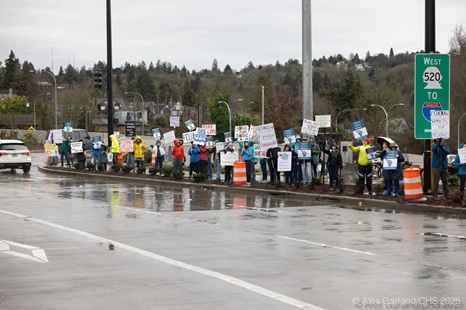
‘Save our Science’ rallies – with some of the best protest signs so far – bring fight against Trump cuts to Montlake Blvd E
Montlake Blvd E above 520 isn’t where you might typically see a protest in Seattle but a “Save our Science” demonstration there Wednesday morning caught the city’s attention. Workers at the National Oceanic and Atmospheric Administration are raising alarms over looming job cuts they say threaten critical scientific research, fisheries sustainability, and the livelihoods of coastal communities. Speaking anonymously out of fear for their jobs, employees at NOAA’s Northwest Fisheries Science Center and Alaska Fisheries Science Center are calling attention to the far-reaching consequences of federal funding and staffing reductions. 13 Photos, more, >>CLICK TO READ<< 13:38
California Fish and Game Commission approve emergency regulations for coonstripe shrimp fishery, EFP to test longlining gear
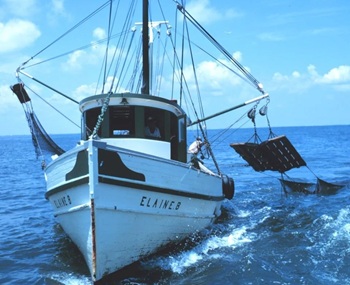 The California Fish and Game Commission announced the adoption of emergency regulations for the commercial coonstripe shrimp fishery. In addition, the CFGC also announced the approval of an experimental fishing permit (EFP) to test longlining gear in the Dungeness crab fishery, among other action affecting California’s natural resources during their February 12 and 13 meetings in Sacramento. Officials say that the emergency regulations were adopted for the commercial coonstripe shrimp (Pandalus danae) fishery in order to reduce the risk of whale entanglement in the fishing gear. more, >>CLICK TO READ<< 06:30
The California Fish and Game Commission announced the adoption of emergency regulations for the commercial coonstripe shrimp fishery. In addition, the CFGC also announced the approval of an experimental fishing permit (EFP) to test longlining gear in the Dungeness crab fishery, among other action affecting California’s natural resources during their February 12 and 13 meetings in Sacramento. Officials say that the emergency regulations were adopted for the commercial coonstripe shrimp (Pandalus danae) fishery in order to reduce the risk of whale entanglement in the fishing gear. more, >>CLICK TO READ<< 06:30
The Lobsters At This No-Fuss Oregon Restaurant Are Out-Of-This-World Delicious
 Imagine a place where seafood dreams come true, and the lobster is so good it might make you consider a permanent move to Portland. Welcome to Jake’s Famous Crawfish, a culinary gem that’s been serving up ocean-fresh delights since 1892. Let me tell you, folks, when it comes to seafood in Portland, Jake’s Famous Crawfish is the real deal. This place has been around longer than some countries, and there’s a good reason for that – they know their fish. Now, I know what you’re thinking: “Another seafood joint? What makes this one so special?” Well, hold onto your bibs, because we’re about to dive into a world of crustacean celebration that’ll make your taste buds do a happy dance. Jake’s Famous Crawfish may have ‘crawfish’ in its name, but their lobster game is strong enough to make a New Englander weep with joy. The Maine lobster is the star of the show, and boy, does it know how to work the room. Photos, more, >>CLICK TO READ<< 14:49
Imagine a place where seafood dreams come true, and the lobster is so good it might make you consider a permanent move to Portland. Welcome to Jake’s Famous Crawfish, a culinary gem that’s been serving up ocean-fresh delights since 1892. Let me tell you, folks, when it comes to seafood in Portland, Jake’s Famous Crawfish is the real deal. This place has been around longer than some countries, and there’s a good reason for that – they know their fish. Now, I know what you’re thinking: “Another seafood joint? What makes this one so special?” Well, hold onto your bibs, because we’re about to dive into a world of crustacean celebration that’ll make your taste buds do a happy dance. Jake’s Famous Crawfish may have ‘crawfish’ in its name, but their lobster game is strong enough to make a New Englander weep with joy. The Maine lobster is the star of the show, and boy, does it know how to work the room. Photos, more, >>CLICK TO READ<< 14:49

California loves Dungeness crab. But concerns over whale safety have put the industry in peril
The Dungeness crab season had opened just a few weeks earlier, two months behind schedule, and was off to a slow start. “We’re working very hard to basically get nothing,” said Ogg. Early on a Thursday in late January, Ogg readied his 54-foot fiberglass boat, the Karen Jeanne, for a 16-hour day of hauling 200 crab pots. It was barely 4:30 a.m. at the Spud Point Marina, and Ogg’s crew, Bradlee Titus, 34, and Axel Bjorklund, 22, both multi-generational fishermen, prepared the deck by washing equipment, filling water buckets and packing jars with bait — a stinky, oily mashup of mackerel and squid. At the helm, Ogg tracked water currents and the weather forecast as he moved the boat out of Bodega Bay, past Point Reyes toward the Farallon Islands and San Francisco skyline. Photos, more, >>CLICK TO READ<< 07:09
In memory of Martin “Skooky” Parsons
 Martin Parsons, born Nov. 6, 1937, in Cordova, Alaska, passed away peacefully on Jan. 11, 2025, in Kirkland Washington, at the age of 87 where he lived a “Hell of a life!” He was known affectionately as “Skooky,” a nickname given by the Arvidson family when he was a kid, which stuck with him throughout his life. He was loved, cherished, and respected by his family and countless friends. Born of Scandinavian and Aleut descent, he was the son of Martin and May Parsons. Skooky lived in Alice Cove, grew up in Cordova, and graduated from Cordova High School. Following his education, he enlisted in the Army before returning to Cordova to pursue a career as a commercial fisherman. He spent many years gillnetting on the Copper River Flats and seining in Prince William Sound, embodying the hardworking spirit of Alaska’s fishing community. He was well known for his “marker sets” in Castle, or “round hauling” dogs in Sheep Bay. By Martin Parsons, Jr. more, >>CLICK TO READ<< 08:04
Martin Parsons, born Nov. 6, 1937, in Cordova, Alaska, passed away peacefully on Jan. 11, 2025, in Kirkland Washington, at the age of 87 where he lived a “Hell of a life!” He was known affectionately as “Skooky,” a nickname given by the Arvidson family when he was a kid, which stuck with him throughout his life. He was loved, cherished, and respected by his family and countless friends. Born of Scandinavian and Aleut descent, he was the son of Martin and May Parsons. Skooky lived in Alice Cove, grew up in Cordova, and graduated from Cordova High School. Following his education, he enlisted in the Army before returning to Cordova to pursue a career as a commercial fisherman. He spent many years gillnetting on the Copper River Flats and seining in Prince William Sound, embodying the hardworking spirit of Alaska’s fishing community. He was well known for his “marker sets” in Castle, or “round hauling” dogs in Sheep Bay. By Martin Parsons, Jr. more, >>CLICK TO READ<< 08:04






 William Leslie Hebard, fondly known by friends and family as Burgie Bill, passed away suddenly at his home in Southern Humboldt County on January 29, 2025. Bill was born in Roseburg, Oregon on July 10, 1950 to William Leslie Hebard Sr. and Pat-Calista Hebard At an early age, his family moved to Eureka, where he became a fisherman and a bass player. In the early 1970s, Bill became a member of the Shelter Cove “Mosquito Fleet,” commercial fishing for salmon, tuna and crab on his boat the Burgie, from which he got his name, Burgie Bill. He fished the Cove for over 45 years until he retired in 2022. Bill’s life was one of profound love, adventure, laughter and freewheeling. He was kind, caring, articulate and funny. He was always willing to help out a friend or neighbor in need and wouldn’t hesitate to give a hitchhiker a ride or pull over to help someone with car trouble.
William Leslie Hebard, fondly known by friends and family as Burgie Bill, passed away suddenly at his home in Southern Humboldt County on January 29, 2025. Bill was born in Roseburg, Oregon on July 10, 1950 to William Leslie Hebard Sr. and Pat-Calista Hebard At an early age, his family moved to Eureka, where he became a fisherman and a bass player. In the early 1970s, Bill became a member of the Shelter Cove “Mosquito Fleet,” commercial fishing for salmon, tuna and crab on his boat the Burgie, from which he got his name, Burgie Bill. He fished the Cove for over 45 years until he retired in 2022. Bill’s life was one of profound love, adventure, laughter and freewheeling. He was kind, caring, articulate and funny. He was always willing to help out a friend or neighbor in need and wouldn’t hesitate to give a hitchhiker a ride or pull over to help someone with car trouble. 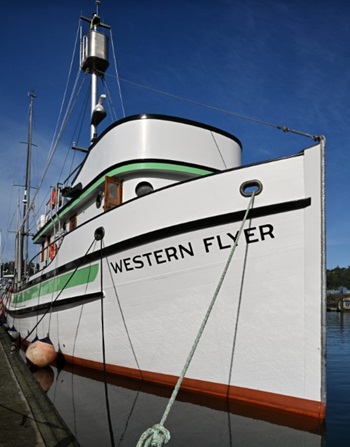 A fishing vessel that was built during the Monterey Bay’s sardine boom and made famous by a Nobel Prize-winning author will return to the site of its former glory after 85 years. The Western Flyer, a state-of-the-art purse seiner when it was built in 1937, was chartered by John Steinbeck and his marine biologist friend, Ed “Doc” Ricketts, for a six-week expedition that would be immortalized in the “Sea of Cortez: A Leisurely Journal of Travel and Research.” Fully renovated to its original specifications and updated with cutting-edge technology, including a hybrid diesel-electric engine and science lab, the Western Flyer will return to the Gulf of California and retrace Steinbeck’s and Ricketts’ groundbreaking journey of discovery. 18 photos,
A fishing vessel that was built during the Monterey Bay’s sardine boom and made famous by a Nobel Prize-winning author will return to the site of its former glory after 85 years. The Western Flyer, a state-of-the-art purse seiner when it was built in 1937, was chartered by John Steinbeck and his marine biologist friend, Ed “Doc” Ricketts, for a six-week expedition that would be immortalized in the “Sea of Cortez: A Leisurely Journal of Travel and Research.” Fully renovated to its original specifications and updated with cutting-edge technology, including a hybrid diesel-electric engine and science lab, the Western Flyer will return to the Gulf of California and retrace Steinbeck’s and Ricketts’ groundbreaking journey of discovery. 18 photos,  In the first conversation Grant Fishbook had with Andy Vitaljic more than a decade ago, Andy surprised the Christ the King Community Church pastor by saying he wanted his tombstone to read, “Andy fed the hungry.” The third-generation Croatian fisherman, who built a commercial seafood empire in Whatcom County and died at the age of 91 in September 2024, got his wish. Andy may be best remembered for his tireless efforts to help people in need, and his mausoleum inscription reflects that. Fishbook said Andy was one of the most generous humans he’d ever met — a compliment that extends to his widow, Erin. “The Vitaljics have their names attached to all kinds of humanitarian organizations around the county,” he said. “Andy was the brain and heart and passion and Erin was the organizer who made sure the ideas actually became real.” Now, Erin is looking for a successor to the empire Andy spent five decades building.
In the first conversation Grant Fishbook had with Andy Vitaljic more than a decade ago, Andy surprised the Christ the King Community Church pastor by saying he wanted his tombstone to read, “Andy fed the hungry.” The third-generation Croatian fisherman, who built a commercial seafood empire in Whatcom County and died at the age of 91 in September 2024, got his wish. Andy may be best remembered for his tireless efforts to help people in need, and his mausoleum inscription reflects that. Fishbook said Andy was one of the most generous humans he’d ever met — a compliment that extends to his widow, Erin. “The Vitaljics have their names attached to all kinds of humanitarian organizations around the county,” he said. “Andy was the brain and heart and passion and Erin was the organizer who made sure the ideas actually became real.” Now, Erin is looking for a successor to the empire Andy spent five decades building.  The sharp bang of an auctioneer’s gavel, due to sound Thursday, Feb. 13, in Berkeley, California, could echo locally. A Wauna man seems a bit anxious. He’s nursing a years-long emotional tie to the formerly junk-piled maritime items for sale, not to mention a financial stake in the auction outcome. “I’m on pins and needles,” Michael Hemp told Gig Harbor Now last week. A Northern California man, the original salvager and owner of the items for the last 49 years, has a lesser emotional tie to the relics. But he maintains hopeful anticipation for a far bigger slice of a potential cash pie. Because the objects Fry, then a teenager, rescued from a scrap heap in Alaska are original parts of the “Western Flyer,” perhaps the most famous fishing boat in the world. Photos,
The sharp bang of an auctioneer’s gavel, due to sound Thursday, Feb. 13, in Berkeley, California, could echo locally. A Wauna man seems a bit anxious. He’s nursing a years-long emotional tie to the formerly junk-piled maritime items for sale, not to mention a financial stake in the auction outcome. “I’m on pins and needles,” Michael Hemp told Gig Harbor Now last week. A Northern California man, the original salvager and owner of the items for the last 49 years, has a lesser emotional tie to the relics. But he maintains hopeful anticipation for a far bigger slice of a potential cash pie. Because the objects Fry, then a teenager, rescued from a scrap heap in Alaska are original parts of the “Western Flyer,” perhaps the most famous fishing boat in the world. Photos, 


























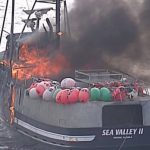

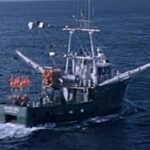
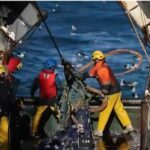
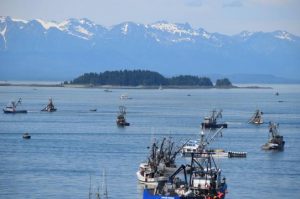
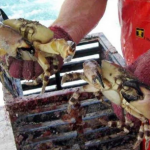




CFACT Comments on the California Offshore Wind Draft Programmatic Environmental Impact Statement (PEIS)
Share this post